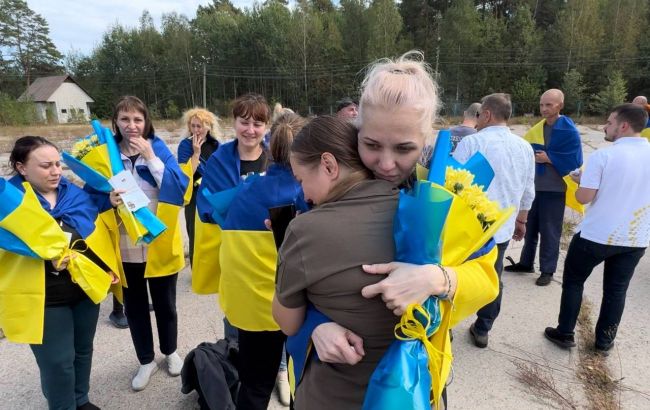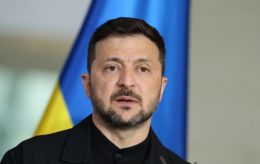15 Azov fighters return to Ukraine after over 2 years in Russian captivity
 Photo: After more than two years in captivity, 15 Azov fighters return to Ukraine
Photo: After more than two years in captivity, 15 Azov fighters return to Ukraine
After a long time in Russian captivity, 15 soldiers of the Azov Regiment of the National Guard of Ukraine returned home. Most of them are women, according to Olena Tolkachova, head of the Azov's patronage service.
This is the first exchange in a long time, as no significant exchanges have taken place since May 2023, when Azov's commanders returned from Türkiye.
The Azov Angels patronage service will take care of the returned soldiers, providing them with treatment, rehabilitation, and psychological support after the difficult experience of captivity.
“For every family that sees and hears the voice of their loved one today, this is the happiest moment since February 2022. But we must continue to fight for all those Azov soldiers who are still in captivity in Russia,” says the head of the Azov patronage service.
Tolkachova called on international organizations, such as the Red Cross and the UN, to continue the fight for the release of all the defenders of Mariupol who are still in captivity.
Defense of Mariupol
On February 24, 2022, the Azov Regiment under the command of Denys Prokopenko took over the defense of Mariupol and the surrounding villages. Already on March 7, 2022, Prokopenko called for closing the skies over Ukraine and preventing a humanitarian catastrophe in Mariupol, as Russian troops were violating the rules of war by shelling civilians and destroying infrastructure.
On April 20, Azov's deputy commander Sviatoslav Palamar asked to evacuate civilians and soldiers from the city. On April 28, when Mariupol was completely blockaded, Azov published a video showing civilians and the wounded being pulled out from under the rubble on the territory of the Azovstal plant.
On May 11, 38 Russian air raids were carried out on the territory of Azovstal, including attacks by strategic bombers. Russian artillery, tanks, and other weapons continued to shell the plant. Russian troops tried to storm the shelters where the Ukrainian defenders were located. Due to information leaks, the supply of ammunition, medicines, and communications equipment to Mariupol was cut off, resulting in significant losses.
On May 13, Russians launched a ground operation against Ukrainian defenders in Mariupol. Despite constant bombardment, Ukrainian soldiers continued to hold the line. On May 15, Russia used incendiary shells, including, probably, phosphorus bombs. The Russian shelling caused large-scale fires on the territory of the plant, where about 600 seriously wounded soldiers remained, unable to receive proper medical care.
On May 20, 2022, after 86 days of defense, the remnants of the Azov garrison were ordered to stop the resistance and surrender. Some relatives of the soldiers reported so-called normal conditions of detention in the occupied territory of the Donetsk region, but most had no information about their relatives.
Russian terrorist attack in Olenivka
On July 29, 2022, Russia killed 53 Ukrainian prisoners of war by striking the colony. This was an attempt to blame Ukraine and hide the torture of prisoners.
On September 21, 2022, a large-scale prisoner exchange took place, during which 108 Azov fighters were released. Five commanders, including Denys Prokopenko, Sviatoslav Palamar, and Oleh Khomenko, agreed to remain in Türkiye under the protection of President Erdogan until the end of the war.
Last year, the Russian authorities began a trial against 22 Ukrainian prisoners of war, members of the Azov Brigade, who were captured last May. They were charged with so-called terrorism. In total, 24 people were charged, but two of them were exchanged for Russian prisoners of war.
Among the accused defenders of Mariupol who were held at Azovstal were eight women who worked as cooks for the Ukrainian military. The prisoners face sentences ranging from 15 years to life in prison.
Earlier, the head of the Defense Intelligence of Ukraine, Kyrylo Budanov, said that the priority in future prisoner exchanges with Russia would be the seriously wounded, women, and all those who defended Azovstal. However, according to him, they are the most difficult to exchange.

